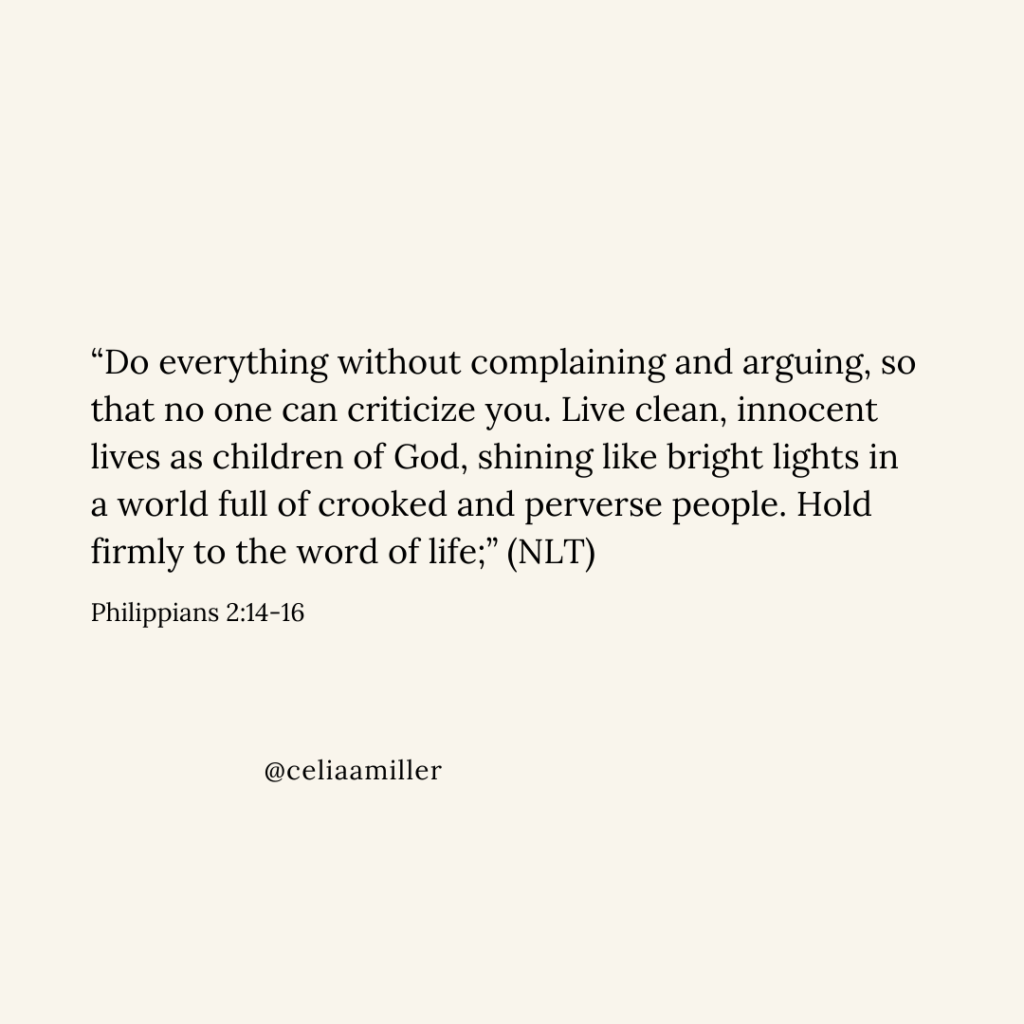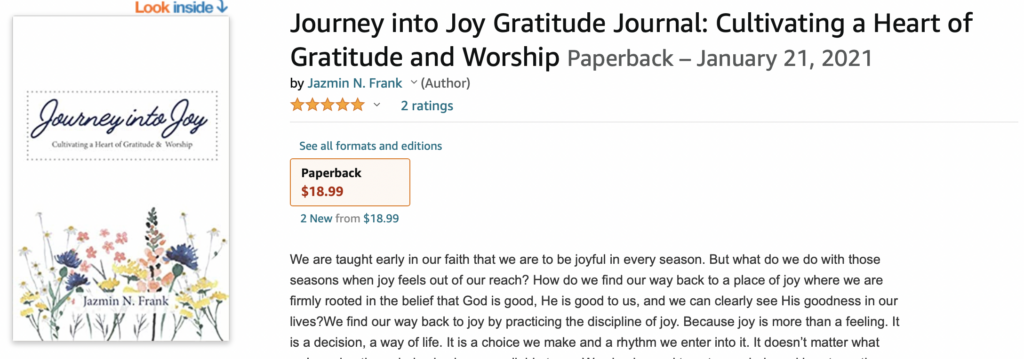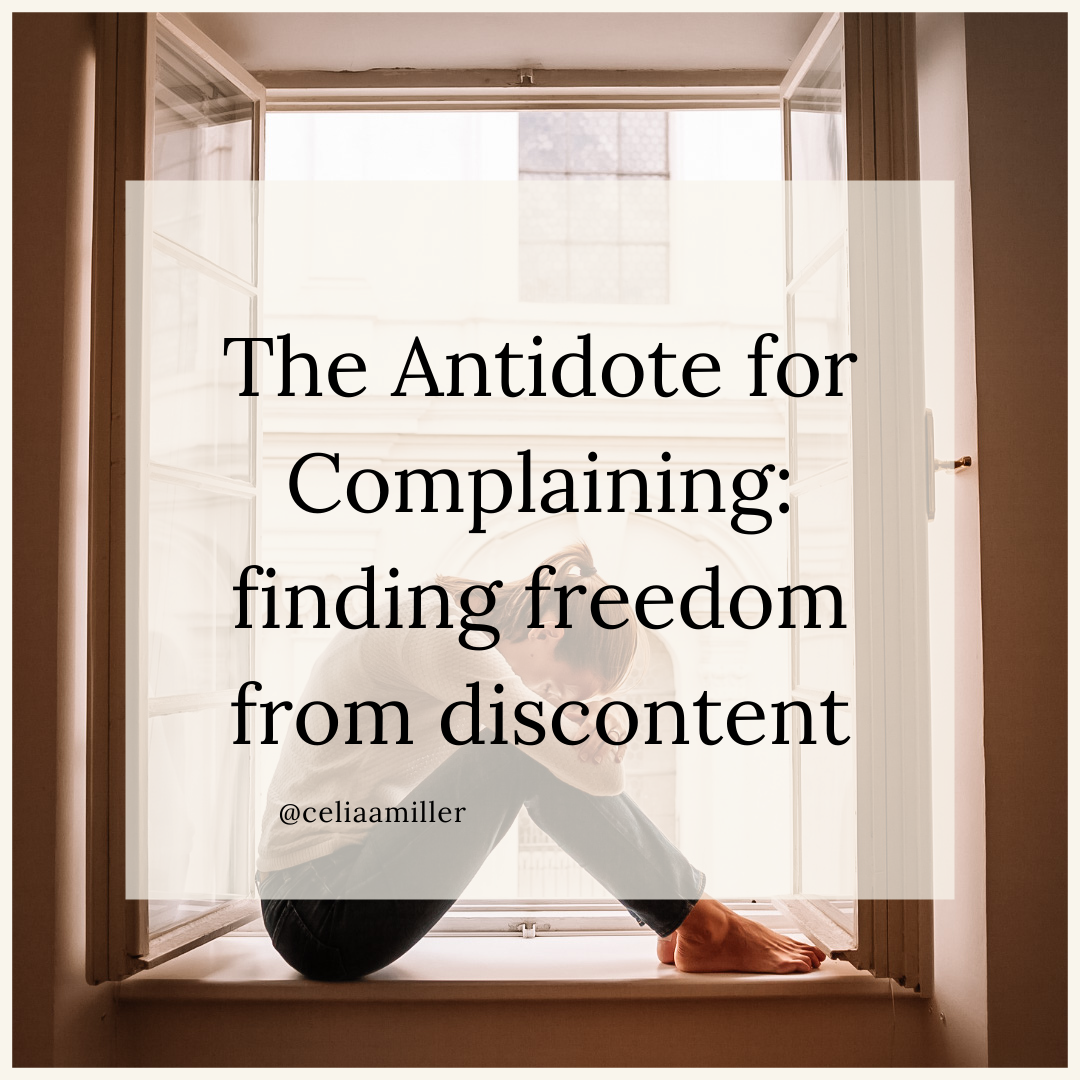The Antidote for Complaining: finding freedom from discontent
I must admit that as of late I’ve fallen into the bad habit of complaining.
I’ve been a grumbler and complainer — a criticizer and critiquer.
For the past few weeks, I’ve allowed myself to blame others for my own anger and sadness. It started slowly with a sigh of contempt here and a slight point of the finger there.
Maybe you can relate, friend, if any of your thoughts (or out loud proclamations) have sounded similar to this:
If my spouse would just change then I would be happy.
If my clients at work weren’t so rude then I would enjoy my job more.
If I looked like her then I would feel good about myself.
If I was successful like her, then I would be happy.
Why does this always happen to me?
And you know what I’ve noticed lately as I’ve sat in this kind of green hazed funk? Complaining doesn’t fix my situation or bring healing, it only makes me more miserable! It’s as if I’ve gotten stuck in a sinkhole and instead of reaching upward for a way out, I’ve grabbed a shovel and continued to dig down deeper with disdainful words and toxic thought patterns.
Do Everything Without Complaining
I sat down one early Sunday morning with my Bible open and a cup of hot tea. My soul felt heavy and I woke yet again feeling irritated and out of sorts.
I sighed and asked the Lord,
“Why have I felt so down the past few weeks?”
I reluctantly opened my Bible to do my daily tending through Philippians, and the verses for that day — Philippians 2:14-16 — were exactly what I needed to hear from the Lord,
“Do everything without complaining and arguing, so that no one can criticize you. Live clean, innocent lives as children of God, shining like bright lights in a world full of crooked and perverse people. Hold firmly to the word of life;” (NLT)

The book of Philippians was written by the Apostle Paul to the Philippian people encouraging them to continue on in unity with Christ and other believers. What’s interesting about this book of the Bible, is that Paul is writing this letter from prison. He was arrested and detained because of His faith in Jesus.
This man — Paul — who had every reason to complain is encouraging other believers not to!
The aftermath of complaining
As I read Paul’s words, I felt the Holy Spirit strongly and tenderly convict me. He showed me through these verses what happens when we choose to live our lives as grumblers and complainers.
We get stuck in a sinkhole. And that sinkhole may lead to the following:
We leave ourselves open to criticism and chaos
“Do everything without complaining and arguing, so that no one can criticize you.”
In this verse, Paul seems to be referring to outward criticism. But I couldn’t help wonder about inward criticism as well. When I start to complain or grumble, I find that I’m not so gentle with myself or those around me. I begin to criticize the way I look, the things I say, and insecurity quickly takes over. And the more insecure I become about myself, the more critical I become of those around me.
When we choose to complain, we are opening ourselves up to criticism which leads to broken relationships, wounds, and high anxiety. AKA, chaos!
Complaining steals our shine & the glory of God’s light within us
“Live clean, innocent lives as children of God, shining like bright lights…”
As believers, we are given this insanely wonderful gift of God’s presence with us and within us. That means that the Light of eternity shines forth through all who believe that Jesus is Lord. But, when we choose to complain, the brilliance of that Light begins to dull. It’s not because God’s presence gets smaller — He promises to always be with us, no matter what. It’s because our focus changes from Him to us.
Think about it like this: when the main character steps on stage during a play, what does the guy in charge of the stage lighting do? He illuminates the main character because that’s where the focus of the audience is supposed to be! But if that stage lighting man were to accidentally sneeze and take the main character out of the spotlight, it makes them difficult to see.
We are called to constantly place the spotlight on Jesus, but complaining puts the spotlight only on ourselves. This makes the Light of God, His glory, within us harder to notice.
We are called to constantly place the spotlight on Jesus, but complaining puts the spotlight only on ourselves.
Tweet
We become part of the “crooked and perverse” world we live in
“…in a world full of crooked and perverse people.”
Romans 12:2 (also written by the Apostle Paul BTW) tells us that we are not to conform to the pattern of this world but to be transformed by the renewing of our mind. The NLT version puts it this way, “Don’t copy the behavior and customs of this world, but let God transform you into a new person by changing the way you think.”
We are called to be set apart. Because of our new lives in Christ, we are called to be living, breathing examples of Jesus. When we live a life of complaining and grumbling, we are conforming and copying the way this world thinks and lives. We are not living set apart, we are not glorifying Jesus and setting a godly example, we are contributing to the kingdom of darkness.
We forget what’s true
“Hold firmly to the word of life;”
I don’t know about you, friend, but when I’m complaining I am only focusing on how I feel in that given moment, not on what is true. Feelings — although good and created by God — are subject to change and therefore cannot be wholly trusted. God’s Word, His truth, and His steady voice in our lives can be trusted over our feelings.
In Malachi 3:6 we find God proclaiming very clearly to the Israelite people that He does not change. His Word is always good and true, and His voice will forever lead us in the way of Light and life. But we cannot listen to both our selfish desires/shifting feelings and the truth of God at the same time.
Complaining causes us to forget what’s true.
The difference between complaining & venting
Now, I want to clarify something important before moving on: venting and complaining are two completely different things! Venting our frustration, sadness, anger, disappointment, and pain to the Lord or to a trusted friend is 100% ok!
We weren’t created to bottle up all of our feelings and pretend that they aren’t there. In fact, we see King David all throughout the Psalms venting to God about his sin, his enemies, his anxieties, and his sorrows! God wants us to acknowledge how we feel and express it in a healthy way.
When we choose to let our guard down in the presence of God, or someone who loves us dearly, to vent, we are paving a way to the path of healing and creating a way forward.
But venting turns into complaining when we choose to sit in our anger, sadness, worry, or fear and live from that place of hurt. When grumbling, complaining, or arguing becomes a way of life, that’s when it becomes a problem.
The antidote to complaining
So I’ve just hit you with a ton of reasons why we shouldn’t be complaining, but how on earth do we stop once we start?
I believe Paul gives us the answer later on in Philippians 4:6,
“Don’t worry about anything; instead, pray about everything. Tell God what you need, and thank Him for all he has done.” (NLT)
Using this verse, let’s break down what the antidote to complaining is.
Give it to God in prayer
I love that Paul’s first command in this verse is “don’t worry about anything”. Let’s be honest, we have so much in our lives that we could give our energy to worrying about. Our spouses, kids, finances, jobs, friends, illnesses, the future, etc. But instead of worrying — or complaining — we are called to pray about everything.
How awesome is it that God wants to hear about everything weighing on our hearts? Even our complaints and worries!
I see complaining as unbelief rooted in the fear that our needs are not being met. It’s selfishness, to put it bluntly. But the truth is, God is constantly and consistently giving us everything we need — even if it’s not what we want or expected at that moment.
So in order to combat the complaining, we must first turn to God in prayer. By sharing our complaints first with Him, we are giving Him the opportunity to search and transform our hearts. Only He can give us the right perspective and grace we need to face each moment. It’s in the Lord’s strength only that we can move from a place of complaining to a place of contentedness.
Gratitude
Philippians 4:6 ends with the command to thank God for everything that He’s done. In the NIV translation, it says that “in every situation, by prayer and petition, with thanksgiving, present your requests to God.”
Prayer and gratitude — the act of giving thanks — go hand in hand. It seems unnatural to have one without the other. Giving thanks to God shifts our perspective and gets the focus off ourselves and onto the Lord. From there, we are able to recognize and remember what’s true and move from that place of truth.
Gratitude ushers us into the presence of God where I’ve found that it’s mighty difficult to remain miserable. You can practice this in your everyday life by keeping a gratitude journal or perhaps setting reminders on your phone every few hours to praise God for something in your day.
If you’re looking for a way to cultivate a life of joy and gratitude, I personally love Jazmin N. Frank’s “Journey into Joy” guided journal. It includes 12 months out of the year, and a space for each day within the given month to write down what you’re thankful for or what brought you joy that day.

Encouragement
This aspect of our antidote for complaining isn’t necessarily found in Philippians 4:6, but I think it goes with it beautifully all the same. If you find yourself complaining and in a terrible mood, try encouraging someone.
Just the act alone of giving an encouraging word to a friend or a stranger in passing has the power to transform our entire mood. Again, we’re getting the focus off of ourselves and onto someone else. Proverbs 16:24 shows us the impact an encouraging word can have,
“Gracious words are a honeycomb, sweet to the soul and healing to the bones.” (NIV)
Notice how Solomon (the author of Proverbs) doesn’t specify who receives the blessing of gracious words. I wonder if it’s because speaking words of life are just as, if not more, powerful as receiving them.
The Word of God
As broken, sinful, selfish people, it can be really hard to put an end to this habit of complaining. The most important part of this antidote to grumbling and complaining is to remember that we can’t stop doing it on our own.
We need God’s strength, truth, and grace to move our hearts from complaining to rejoicing. The Word of God is full of God’s truth and wisdom and has the power to transform our hearts, minds, and very lives.
As this message of complaining has weighed on my heart, I’ve found that turning to God’s Word and memorizing Scripture is the most powerful tool we can utilize to renew the way we think. Especially when it comes to breaking old chains and forming new life-giving habits!
Here are some verses that are helpful to memorize for when you feel the desire to complain. That way, rather than grumbling, you can replace it with one of these truths from the Bible:
Psalm 106:1: “Praise the Lord! Give thanks to the Lord, for he is good! His faithful love endures forever.” (NLT)
Hebrews 12:28: “Since we are receiving a Kingdom that is unshakable, let us be thankful and please God by worshiping him with holy fear and awe.” (NLT)
Psalm 69:30: “Then I will praise God’s name with singing, and I will honor him with thanksgiving.” (NLT)
Philippians 4:6: “Don’t worry about anything; instead, pray about everything. Tell God what you need, and thank Him for all he has done.” (NLT)
The aftermath of intentionality
When we intentionally choose to pursue gratitude, prayer, encouragement, and Scripture in place of complaining, we find unimaginable joy and peace. We are able to experience the richness of God’s presence in our lives in a way we can’t when we are choosing to only think of ourselves. We have eyes to notice all the ways in which God is moving when we choose to look up and give thanks.
When we intentionally choose to pursue gratitude, prayer, encouragement, and Scripture in place of complaining, we find unimaginable joy and peace.
Tweet
God invites us to be content in every situation and circumstance we face, and yes, it’s possible to do so! It’s possible to find peace in the face of tragedy and discomfort. It may take a little healing and a little time, but it’s possible if we continually seek Jesus over our own expectations and desires.
God’s desire for you, friend, is to live an abundant life in Him — full of grace and mercy and free from anxiety and complaining. My prayer for all of us is that we would choose to relentlessly pursue a life rooted in joy by first uprooting the bitterness caused by habitual grumbling.
A prayer from Psalm 139:23
It can be tough to change our ways, especially when complaining has come to feel as comforting as our favorite blanket. Jesus knows this and instead of shooing us away in disgust and indignation, He invites us to come close.
If stopping the habit of complaining seems overwhelmingly impossible, let’s keep it simple and begin by doing what we talked about today: taking it to God in prayer.
And if you don’t know what to pray, I’ve found that praying Scripture is a simple and powerful way to connect with God on what’s weighing on your heart. So, friend, let’s end today with praying Psalm 139:23 ourselves as we invite God to transforms our hearts.
Search me, O God, and know my heart; test me and know my anxious thoughts. Point out anything in me that offends you, and lead me along the path of everlasting life. Amen.
xo,



so much yes! love this and love Paul’s applicable example for us from a very hard place.
This post definitely hit home! I love the idea of practicing gratitude or encouraging someone else whenever I am in the mood to complain. Thanks for your words of truth, Celia.
Such great reminders! Thank you for sharing!